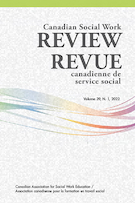Anti-racist education in social work: an exploration of required undergraduate social work courses in Quebec
Social workers play a vital role in helping service users navigate structural barriers and oppressions. Anti-racist social work education trains future social workers to apply critical thinking to the ways in which societal practices of racist exclusion and domination threaten the integrity of racialized individuals and communities. However, inclusion of anti-racist curricula in Schools of Social Work (SSWs) is largely dependent on each individual institution and their course offerings. This study explored the extent to which anti-racist practice is included across social work programs in Quebec through conducting a review of required undergraduate courses. Our results reveal that, among the nine universities that offer Bachelor of Social Work programs across Quebec, only one SSW offered a course that explicitly addressed race. Five out of the nine SSWs include a mandatory course with implicit mention of race under broader terms such as “anti-oppression,” “inequality,” or “intercultural practice.” These findings raise important considerations for social work education in Quebec and the development of anti-racist practitioners across the profession.
Keywords:
- social work,
- social work education,
- anti-racist practice,
- systemic racism,
- race

